Problem solved, refer to my answer, however cannot accept it right now because stack overflow's 2 day rule. Thanks for the input everbody!
edit: The answer is removed, the answer is to remove line:
function registerWindowMessage( lpString : PChar ) : integer; stdcall; external user32 name 'RegisterWindowMessageA';
From the project because it is already defined in delphi windows api files, that's it. No need to redefine it and also the redefine does not match the newer version.
I try to revive/migrate some older Delphi 5 Enterprise (32bit) projects to a new/modern Delphi version (Delphi 10.2, 32bit) however the old versions compiles and run fine on any OS. Overall, pretty compatible.
Now I am running into this strange problem, the Delphi 10.2 form does not like to handle SHELLHOOK messages, the older compiled Delphi 5 version does. Because I don't have the source of Delphi 10.2 (free edition) forms.pas I can't see what is actually going on (different) and can't figure out why it doesn't work. Unable to debug it.
The hook registration seems to be fine, the writeln's in the FormCreate shows the following values (in extra console window):
However the overrided WndProc procedure does not handle any shellhook messages. I made a demo so you can try it yourself by creating a new project, double click on the form's onCreate and onDestroy event and replace the forms code with this:
unit main;
interface
uses
Winapi.Windows, Winapi.Messages, System.SysUtils, System.Variants, System.Classes, Vcl.Graphics,
Vcl.Controls, Vcl.Forms, Vcl.Dialogs;
const
// Constant for shell hook events
HSHELL_WINDOWCREATED = 1;
HSHELL_WINDOWDESTROYED = 2;
HSHELL_ACTIVATESHELLWINDOW = 3;
HSHELL_WINDOWACTIVATED = 4;
HSHELL_GETMINRECT = 5;
HSHELL_REDRAW = 6;
HSHELL_TASKMAN = 7;
HSHELL_LANGUAGE = 8;
HSHELL_ACCESSIBILITYSTATE = 11;
type
TForm1 = class(TForm)
procedure FormCreate(Sender: TObject);
procedure FormDestroy(Sender: TObject);
procedure FormShow(Sender: TObject);
procedure FormActivate(Sender: TObject);
private
{ Private declarations }
FHookMsg : integer;
procedure WMShellHook(var Msg: TMessage );
protected
procedure WndProc(var Msg : TMessage); override;
public
{ Public declarations }
end;
var
Form1: TForm1;
// Not implemented Windows API functions, available at WinXP and later
function registerWindowMessage( lpString : PChar ) : integer; stdcall; external user32 name 'RegisterWindowMessageA';
function registerShellHookWindow( hWnd : THandle ) : bool; stdcall; external user32 name 'RegisterShellHookWindow';
function deregisterShellHookWindow( hWnd : THandle ) : bool; stdcall; external user32 name 'DeregisterShellHookWindow';
implementation
{$R *.dfm}
procedure TForm1.FormActivate(Sender: TObject);
begin
// send a message
sendMessage( handle, WM_USER+$40, 1, 2 );
postMessage( handle, WM_USER+$40, 3, 4 );
end;
procedure TForm1.FormCreate(Sender: TObject);
begin
writeln( handle );
FHookMsg:=registerWindowMessage('SHELLHOOK'+#0 );
writeln( FHookMsg );
writeln( registerShellHookWindow( handle ) );
writeln( handle ); // handle still the same
end;
procedure TForm1.FormDestroy(Sender: TObject);
begin
deregisterShellHookWindow( handle );
writeln( handle ); // set breakpoint here, handle still the same
end;
procedure TForm1.FormShow(Sender: TObject);
begin
writeln( handle ); // handle still the same
end;
procedure TForm1.WndProc(var Msg : TMessage);
begin
// writeln( handle ); even when i showed this, handle is still the same
if( Msg.Msg = WM_USER+$40 ) then
begin
writeln( 'wParam is: ', Msg.wParam );
writeln( 'lParam is: ', Msg.lParam );
exit;
end;
if( Msg.Msg = FHookMsg ) then
begin
// Not executed in Delphi 10.2 generated exe
writeln( 'wParam is: ', Msg.wParam );
WMShellHook( Msg );
exit;
end;
inherited; // call this for default behaviour
end;
procedure TForm1.WMShellHook( var Msg: TMessage );
begin
// Simple however effective way to detect window changes at low costs.
if( Msg.wparam = HSHELL_WINDOWCREATED )
or ( Msg.wparam = HSHELL_WINDOWDESTROYED )
or ( Msg.wparam = HSHELL_WINDOWACTIVATED ) then
begin
// Not executed in Delphi 10.2 generated exe
writeln('here' );
end;
end;
end.
PS: Don't forget to switch linker option "generate console application" on to avoid writeln errors while running this demo.
Can somebody tell what's going on and why it doesn't work?
EDIT:
Example with allocateHwnd and deallocateHwnd, does not receive anything. Why not? Followed this example.
unit unit1;
interface
uses
Winapi.Windows, Winapi.Messages, System.SysUtils, System.Classes, Vcl.Graphics,
Vcl.Controls, Vcl.Forms, Vcl.Dialogs;
const
// Constant for shell hook events
HSHELL_WINDOWCREATED = 1;
HSHELL_WINDOWDESTROYED = 2;
HSHELL_ACTIVATESHELLWINDOW = 3;
HSHELL_WINDOWACTIVATED = 4;
HSHELL_GETMINRECT = 5;
HSHELL_REDRAW = 6;
HSHELL_TASKMAN = 7;
HSHELL_LANGUAGE = 8;
HSHELL_ACCESSIBILITYSTATE = 11;
type
TForm1 = class(TForm)
procedure FormCreate(Sender: TObject);
procedure FormDestroy(Sender: TObject);
private
{ Private declarations }
FHookWndHandle : THandle;
FHookMsg : integer;
procedure WMShellHook(var Msg: TMessage );
protected
procedure WndMethod(var Msg: TMessage);
public
{ Public declarations }
end;
var
Form1: TForm1;
// Not implemented Windows API functions, available at WinXP and later
function registerWindowMessage( lpString : PChar ) : integer; stdcall; external user32 name 'RegisterWindowMessageA';
function registerShellHookWindow( hWnd : THandle ) : bool; stdcall; external user32 name 'RegisterShellHookWindow';
function deregisterShellHookWindow( hWnd : THandle ) : bool; stdcall; external user32 name 'DeregisterShellHookWindow';
implementation
{$R *.dfm}
procedure TForm1.FormCreate(Sender: TObject);
begin
FHookWndHandle:=allocateHWnd(WndMethod);
FHookMsg:=registerWindowMessage('SHELLHOOK'+#0 );
writeln( FHookMsg );
writeln( registerShellHookWindow( FHookWndHandle ) );
end;
procedure TForm1.FormDestroy(Sender: TObject);
begin
deregisterShellHookWindow( FHookWndHandle );
deallocateHWnd( FHookWndHandle );
end;
procedure TForm1.WndMethod(var Msg: TMessage);
begin
if( Msg.Msg = FHookMsg ) then
begin
// Not executed in Delphi 10.2 generated exe
writeln( 'wParam is: ', Msg.wParam );
WMShellHook( Msg );
exit;
end;
end;
procedure TForm1.WMShellHook( var Msg: TMessage );
begin
// Simple however effective way to detect window changes at low costs.
if( Msg.wparam = HSHELL_WINDOWCREATED )
or ( Msg.wparam = HSHELL_WINDOWDESTROYED )
or ( Msg.wparam = HSHELL_WINDOWACTIVATED ) then
begin
// Not executed in Delphi 10.2 generated exe
writeln('here' );
end;
end;
end.
